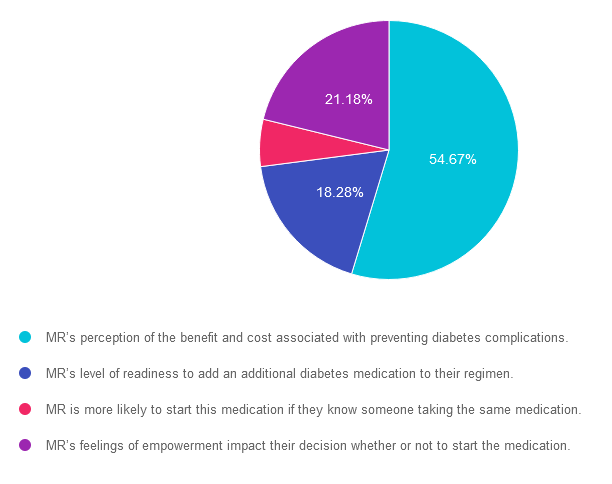
For last week’s practice question, we quizzed participants on person-centered care. 55% of respondents chose the best answer. We want to clarify and share this important information, so you can pass it on to people living with diabetes and your colleagues, plus prepare for exam success!
Before we start though, if you don’t want any spoilers and haven’t tried the question yet, you can answer it below: Answer Question
Question: MR has an A1C of 9.6% and is deciding whether or not to start another diabetes medication to help lower their glucose. MR’s parent had diabetes and severe complications due to chronic hyperglycemia.
What would best describe the application of the Health Belief Model in this situation?
Answer Choices:
- MR’s perception of the benefit and cost associated with preventing diabetes complications.
- MR’s level of readiness to add an additional diabetes medication to their regimen.
- MR is more likely to start this medication if they know someone taking the same medication.
- MR’s feelings of empowerment impact their decision whether or not to start the medication.

Getting to the Best Answer
If you are thinking about taking the certification exam, this practice test question will set you up for success. Test writers anticipate possible answers based on the details in the question. They will wave those “juicy answers” right under your nose. Your job is to weed through the particulars, pluck out the most important elements and choose the BEST answer.
Answer 1 is correct. 54.67% chose this answer. “MR’s perception of the benefit and cost associated with preventing diabetes complications.” GREAT JOB. The Health Belief Model (HBM) focuses on individual beliefs and perceptions about health-related behavior change. It suggests that behavior change is influenced by an individual’s perception of the severity of a health problem, their susceptibility to it, the benefits of behavior change, and the barriers or cues to action. In other words it looks at the cost-benefit of a given situation.
Answer 2 is incorrect. 18.28% of you chose this answer. “MR’s level of readiness to add an additional diabetes medication to their regimen.” This answer actually refers the Stages of Change (transtheoretical) Model: This model proposes that individuals go through a series of stages when changing behavior: precontemplation, contemplation, preparation, action, and maintenance. It suggests that people move through these stages in a cyclical manner and that interventions should be tailored to each stage.
Answer 3 is incorrect. About 5.88% of respondents chose this. “MR is more likely to start this medication if they know someone taking the same medication.” This answer reflects the Social Cognitive Theory (SCT): This theory emphasizes the reciprocal interaction between personal factors (such as cognition and self-efficacy), environmental factors, and behavior. It suggests that behavior change is influenced by observing others (social modeling), self-regulation, and the belief that one can successfully perform the behavior (self-efficacy).
Finally, Answer 4 is incorrect. 21.18% chose this answer. “MR’s feelings of empowerment impact their decision whether or not to start the medication.” This answer refers to the empowerment model which is a theoretical framework that focuses on empowering individuals or communities to take control of their own lives and make informed decisions. It emphasizes the importance of promoting autonomy, self-efficacy, and participation in decision-making processes. The empowerment model is often applied in various fields, including social work, community development, healthcare, and education.
Behavior Change Theories Explained – LIVE FREE Webinar
August 23rd, @ 11:30 am PST

Learning behavior change theories and getting to the best answer for certification exams can be tricky. To say thanks for 25 years, Coach Beverly is going to host a FREE Webinar where she dissects common learning theories that are not only helpful for your clinical practice, but also for exam preparation.
Join her August 23rd at 11:30 am PT. For live webinars, Coach Beverly stays after class to answer any lingering questions you may have on the topic.
We hope you appreciate this week’s rationale! Thank you so much for taking the time to answer our Question of the Week and participate in this fun learning activity!
ReVive 5 Diabetes Training Program
“ReVive 5 Program is the best program I have ever attended – should be required for all diabetes educators! Thank you so much for translating this research into practical approaches!!” – Sarah F.
Save $100! Enroll now to watch the webinar on-demand

ReViVE 5 Diabetes Training Program:
Unlocking Hidden Barriers to Diabetes Management
Enroll Now and Save $100!
Recorded & Ready to Watch
Addressing diabetes distress can be tricky, even for seasoned healthcare professionals.
We invite you to attend this hands-on training program that provides the essential steps to address diabetes distress combined with an innovative approach to glucose management. Our experts offer realistic strategies to address diabetes distress that you can immediately apply to your practice setting. Plus, the ReVive 5 Program provides a breadth of tools and resources to create more meaningful connections with people with diabetes.
Team of Experts: ReVive 5 is taught by a team of 3 Interdisciplinary Experts:
- Lawrence Fisher, Ph.D., ABPP, Professor Emeritus, UCSF
- Susan Guzman, PhD
- Beverly Thomassian, RN, MPH, CDCES, BC-ADM
Accredited Training Program:
- 15.0 CEs – Includes the 7-hour ReVive 5 Training Program, Certificate, and 5 FREE bonus courses to supplement content.
- A comprehensive set of assessment tools, educational materials, log sheets, and resources.
“ReVive 5” breathes new life into our relationship with diabetes, bringing a fresh perspective to both the person with diabetes and the provider.
All hours earned count toward your CDCES Accreditation Information
Sign up for Diabetes Blog Bytes – we post one daily Blog Byte from Monday to Friday. And of course, Tuesday is our Question of the Week. It’s Informative and FREE! Sign up below!
The use of DES products does not guarantee the successful passage of the diabetes certification exams. CBDCE & ADCES does not endorse any preparatory or review materials for the certification exams, except for those published by CBDCE & ADCES.









